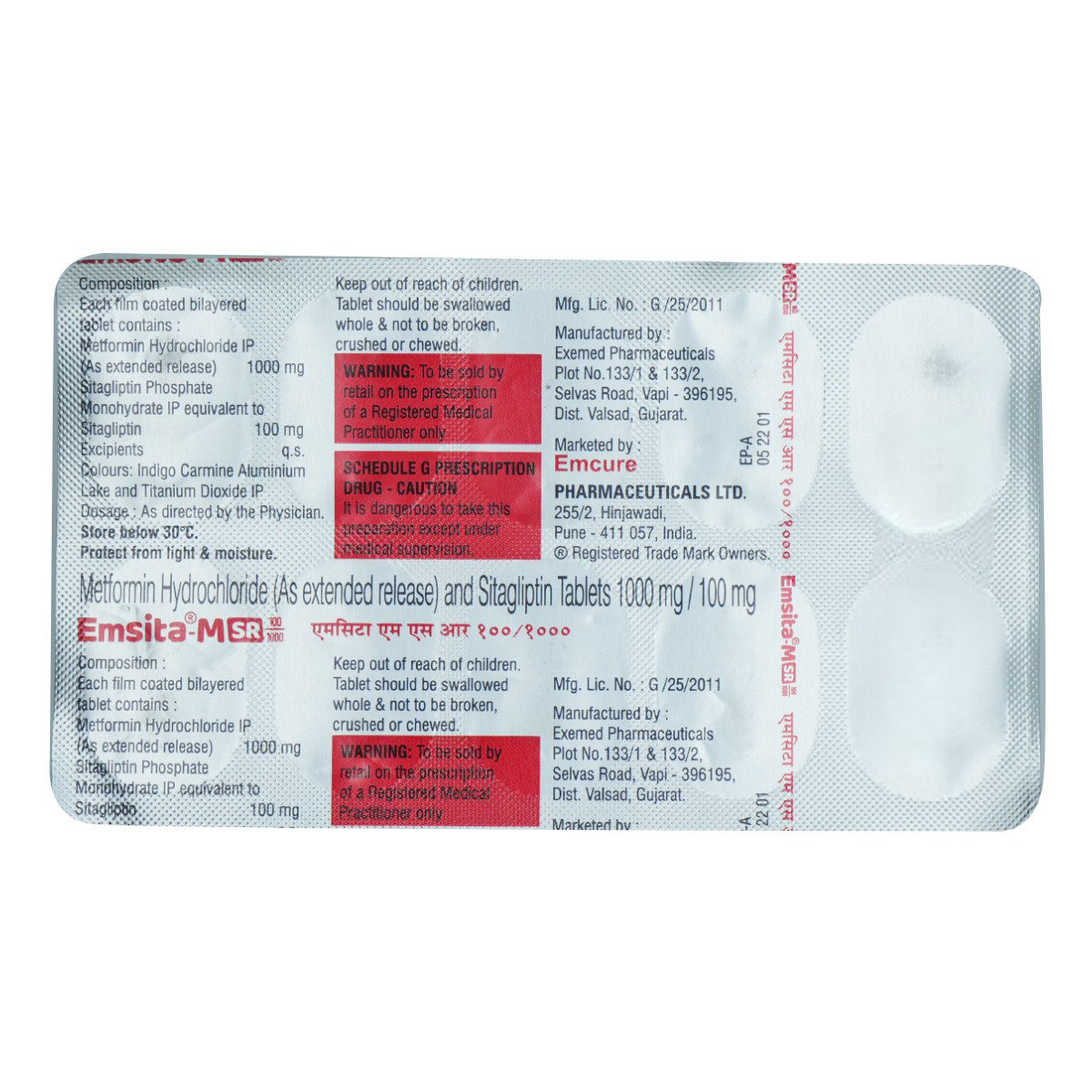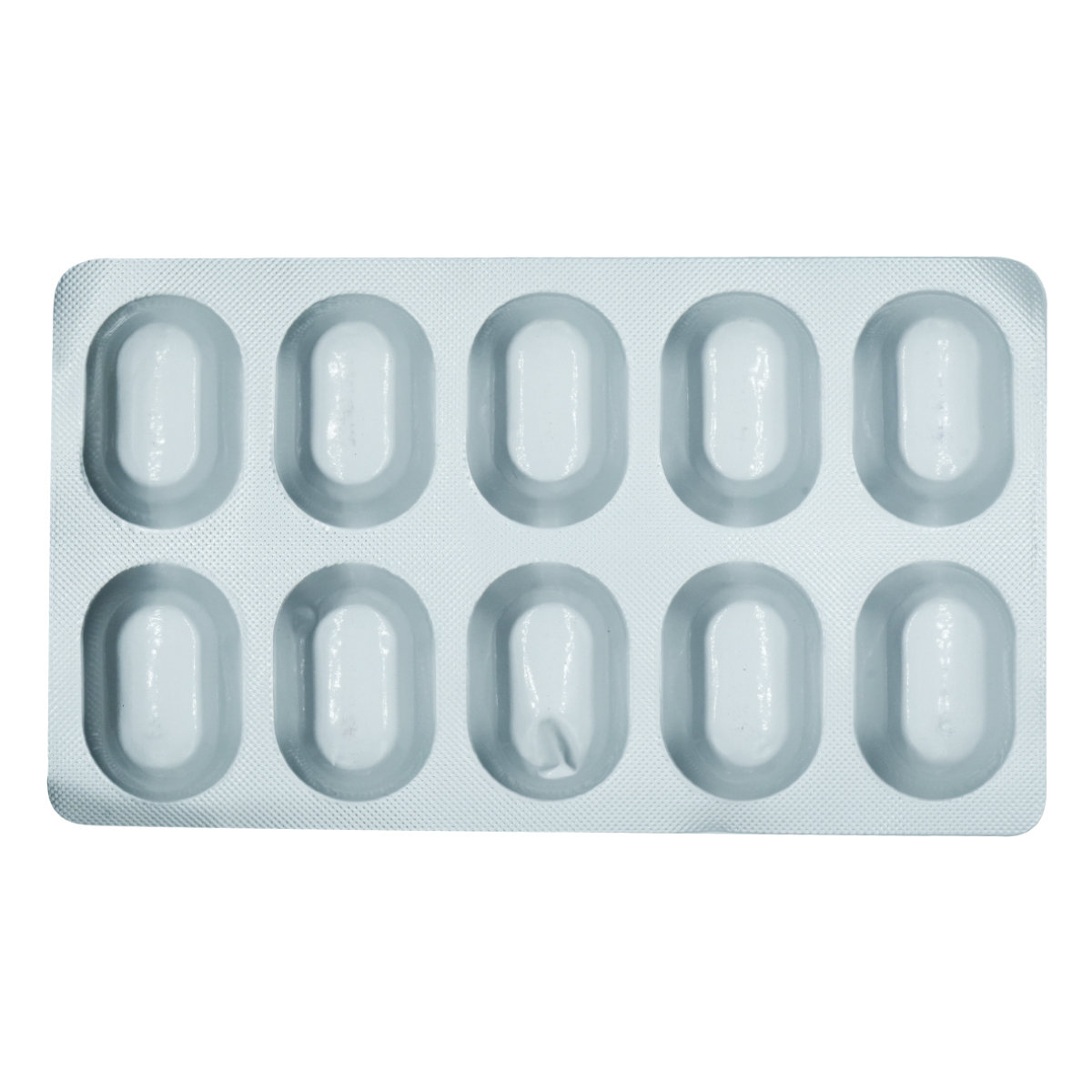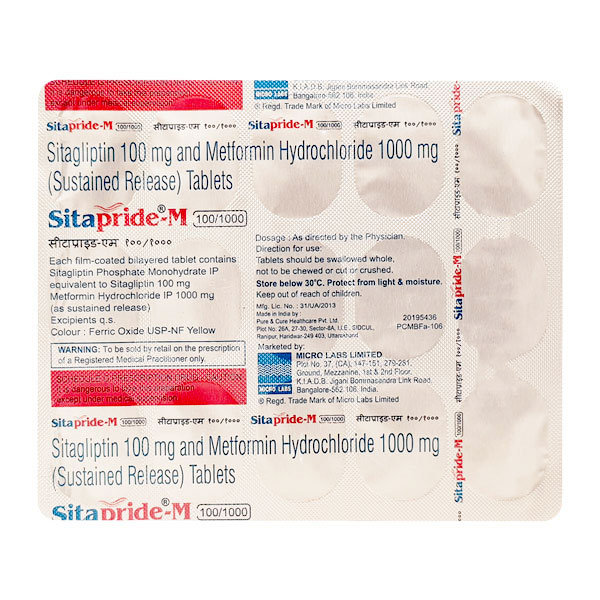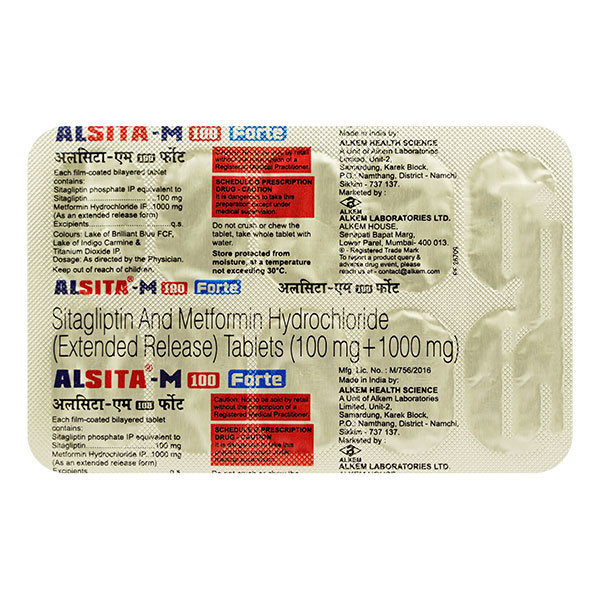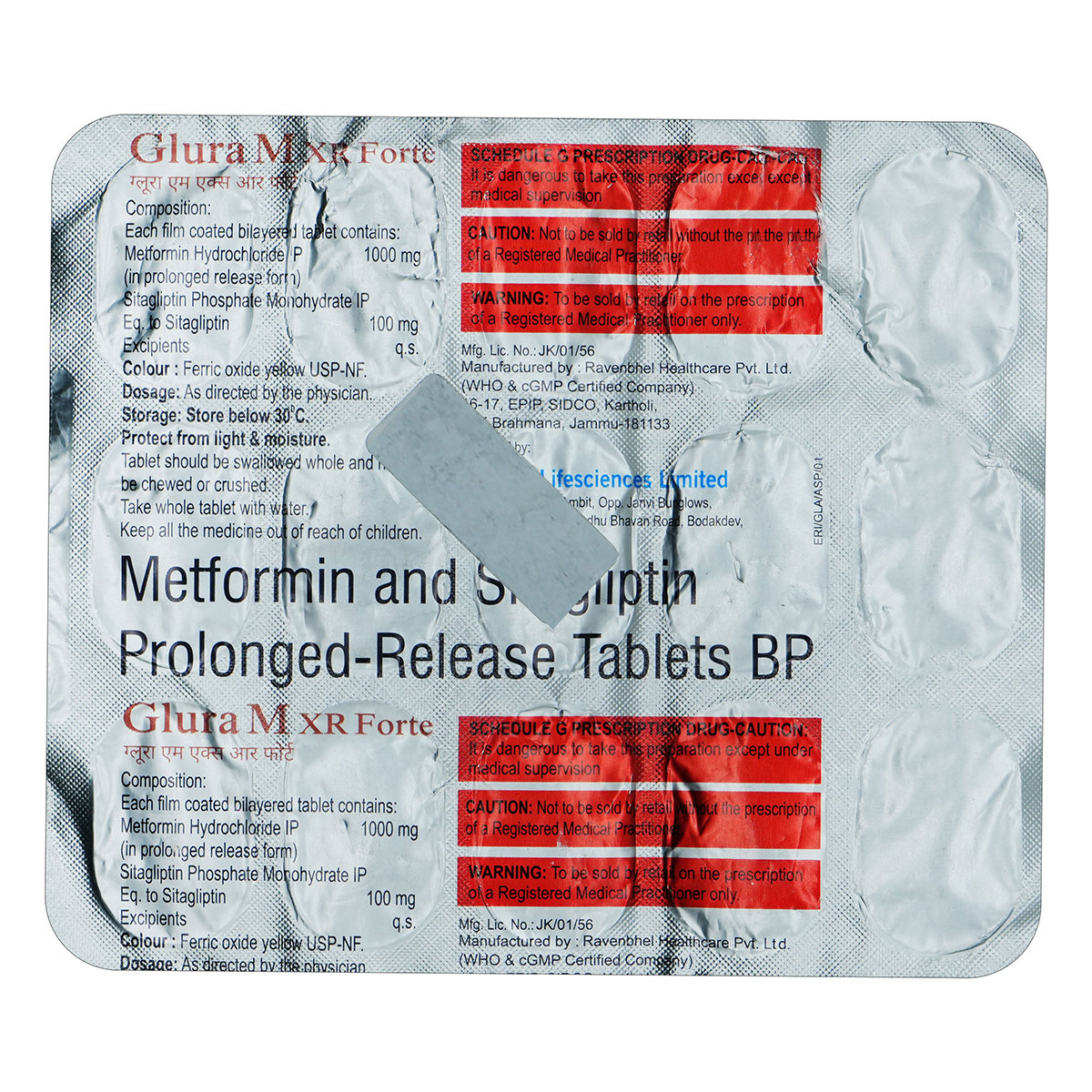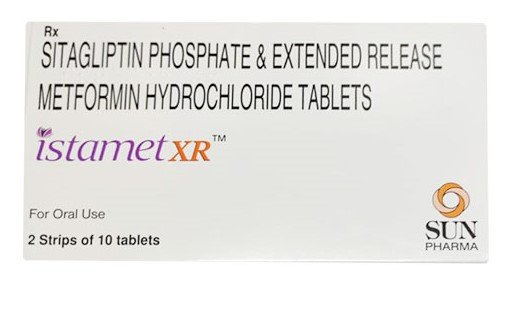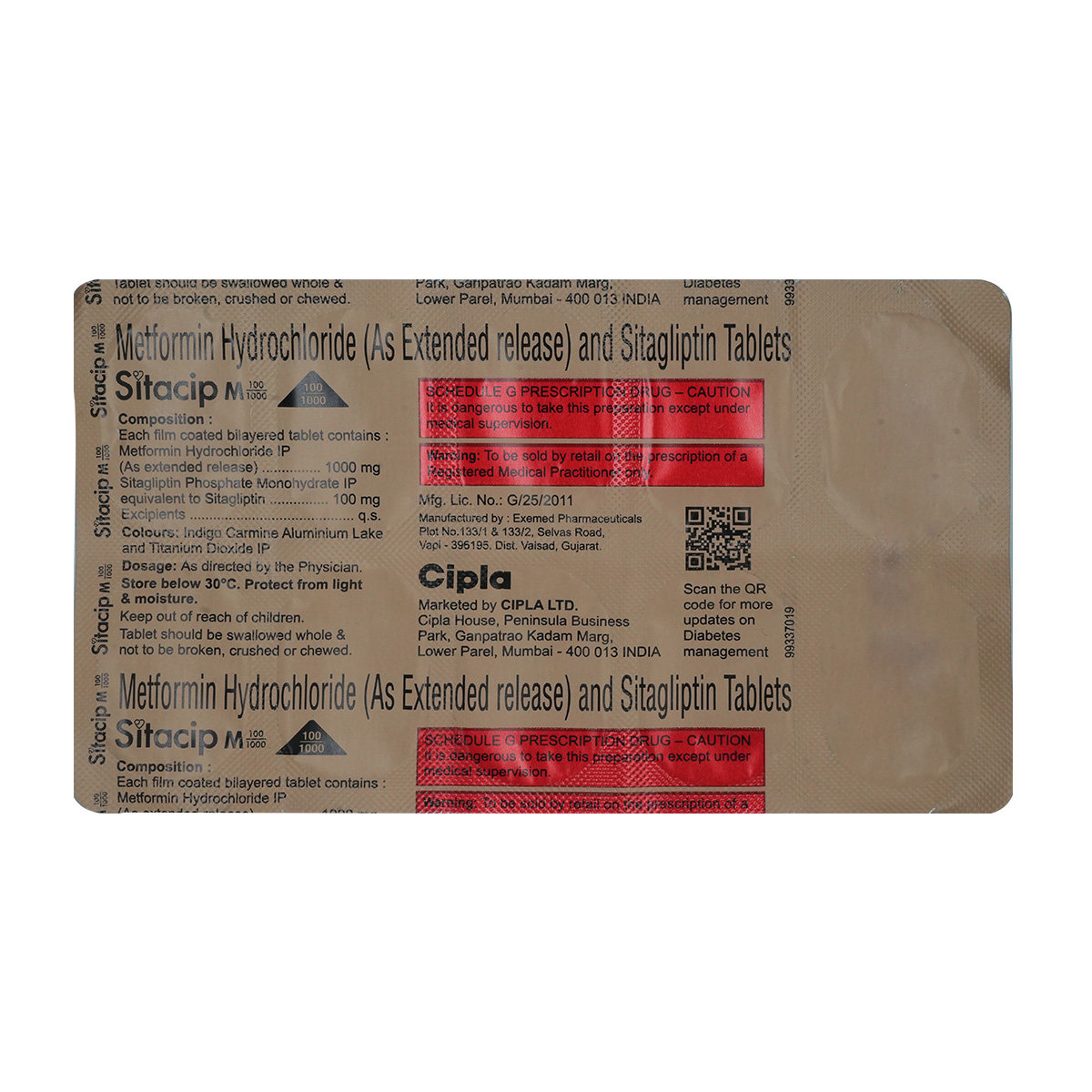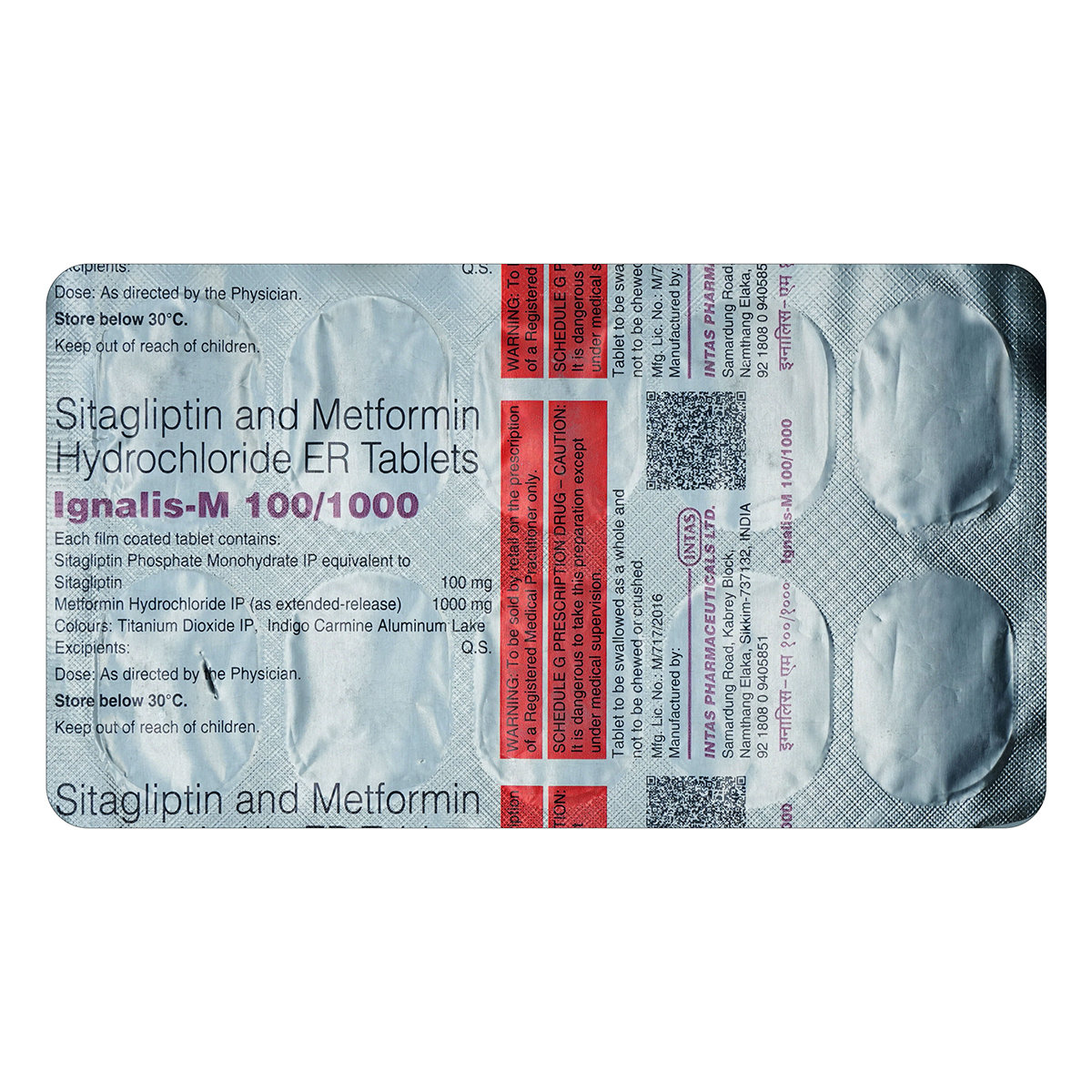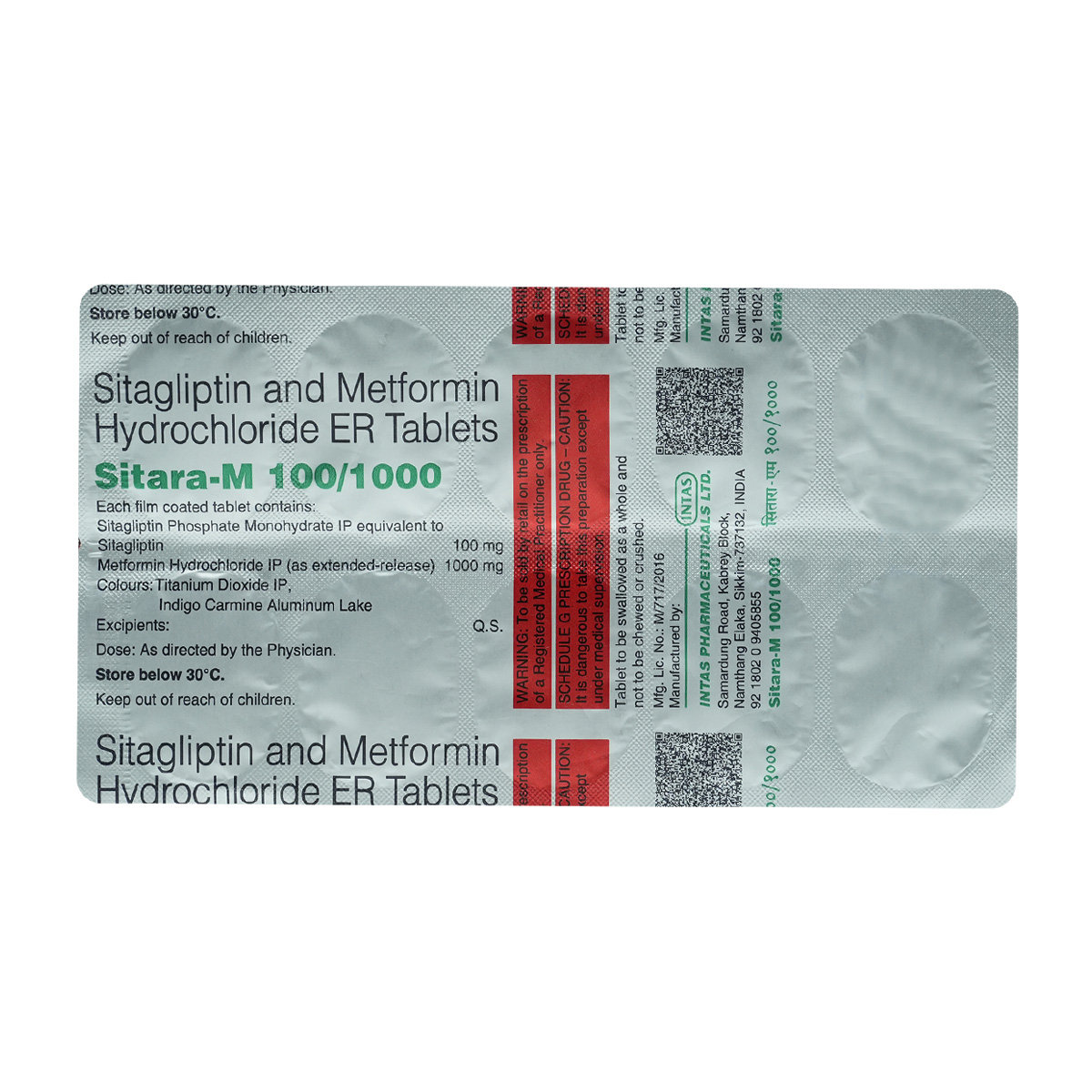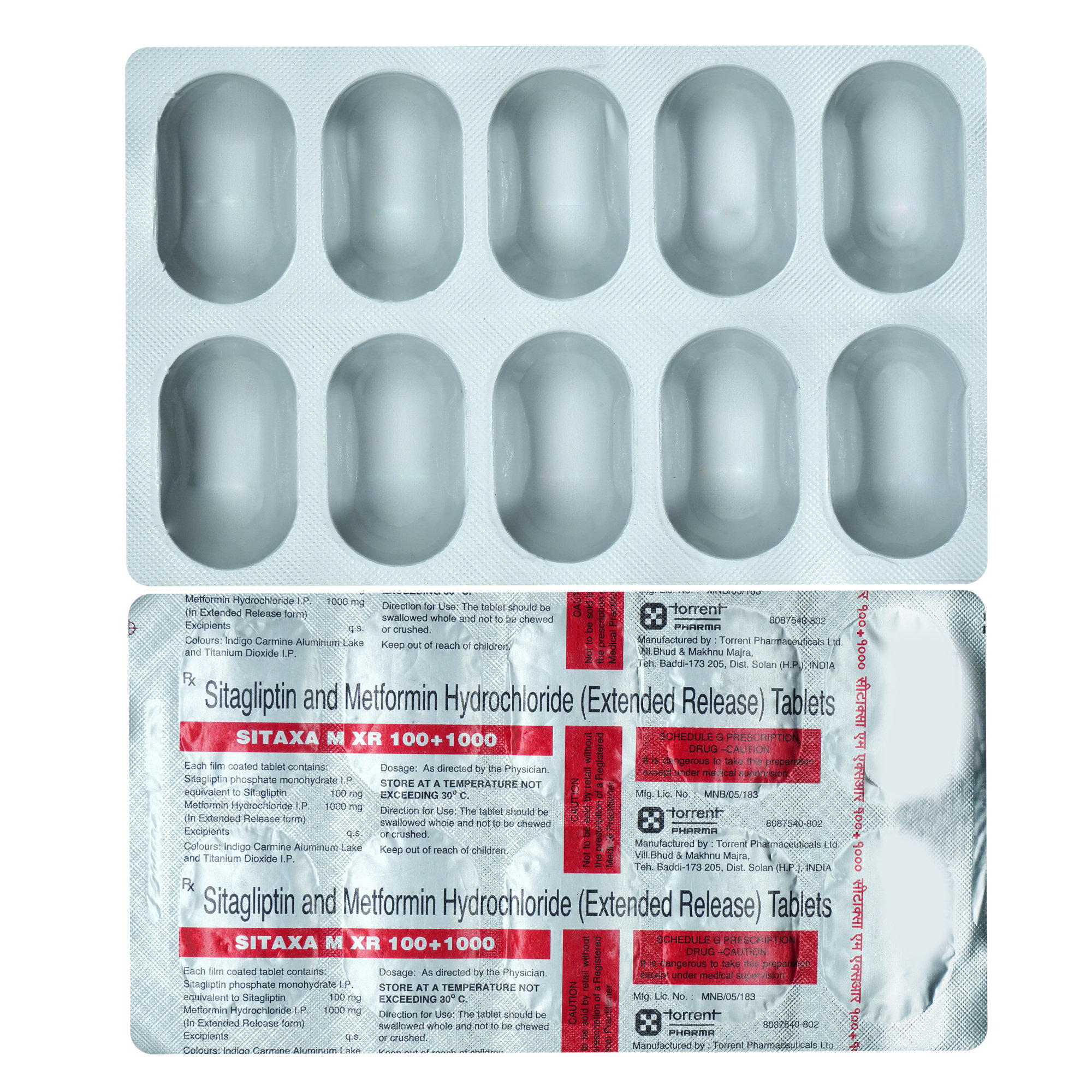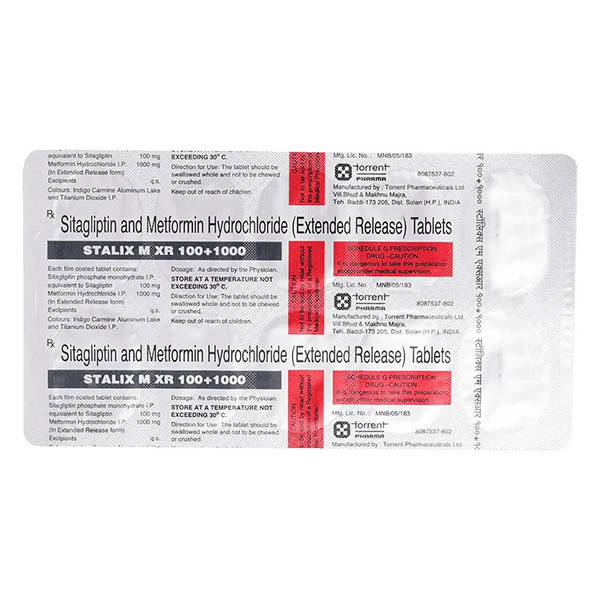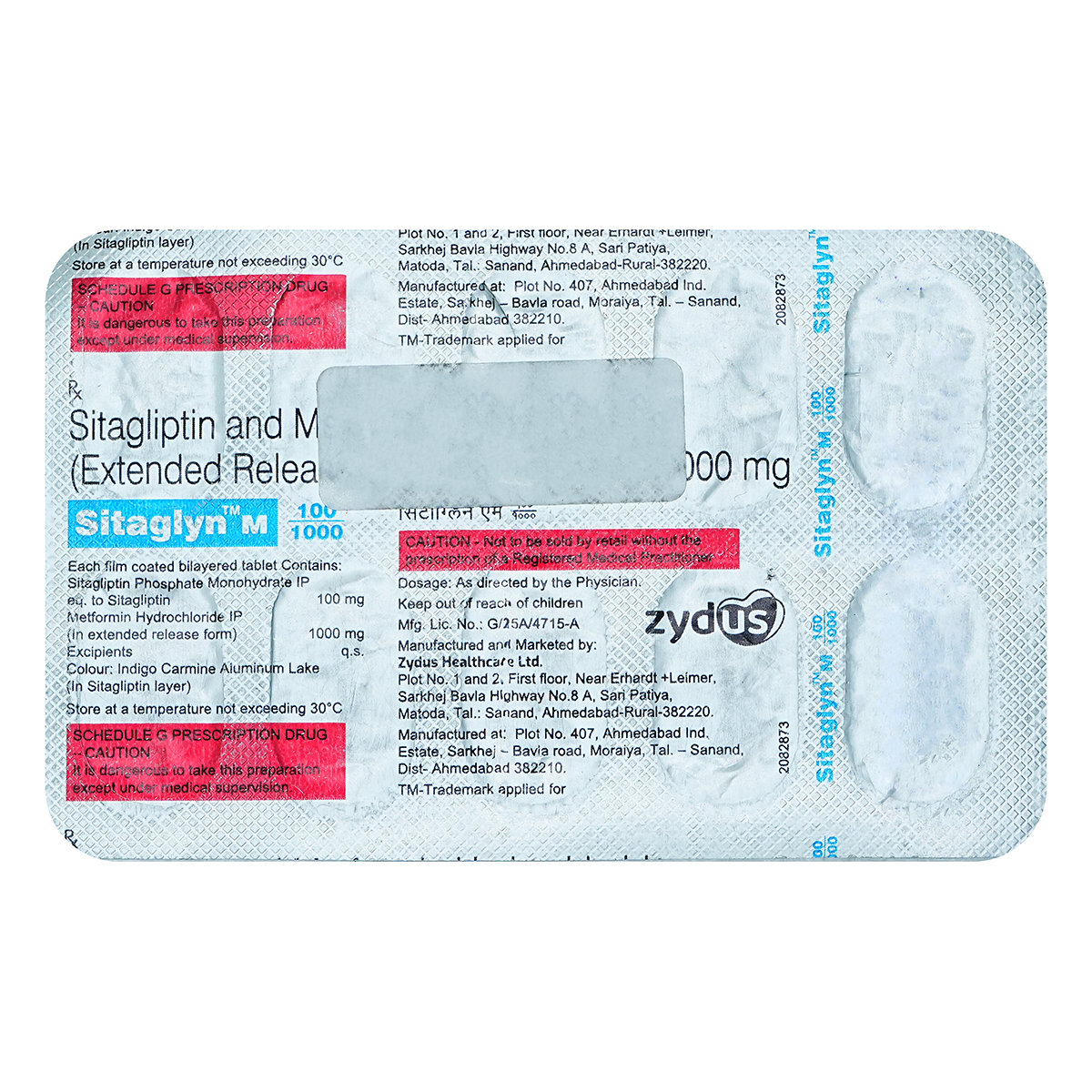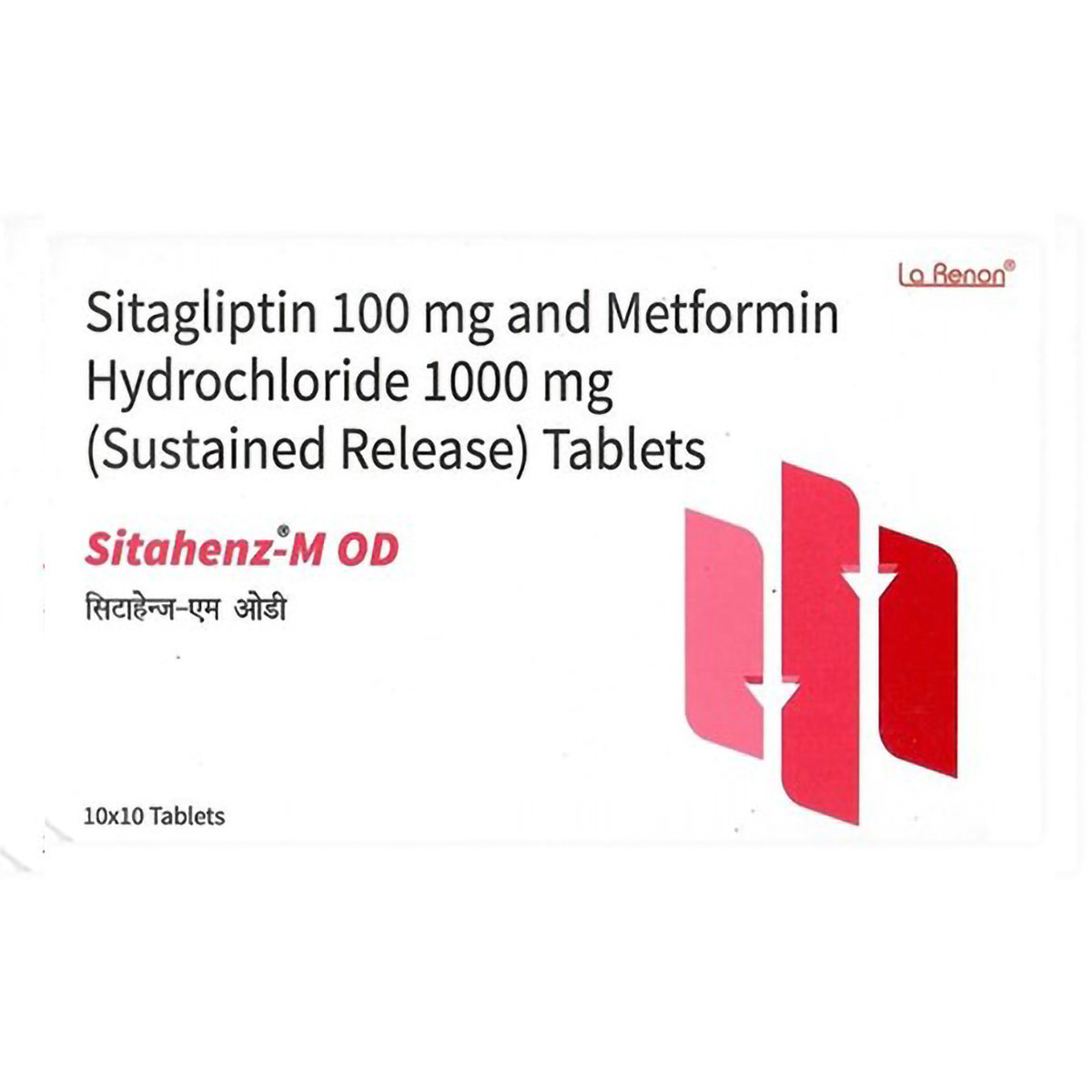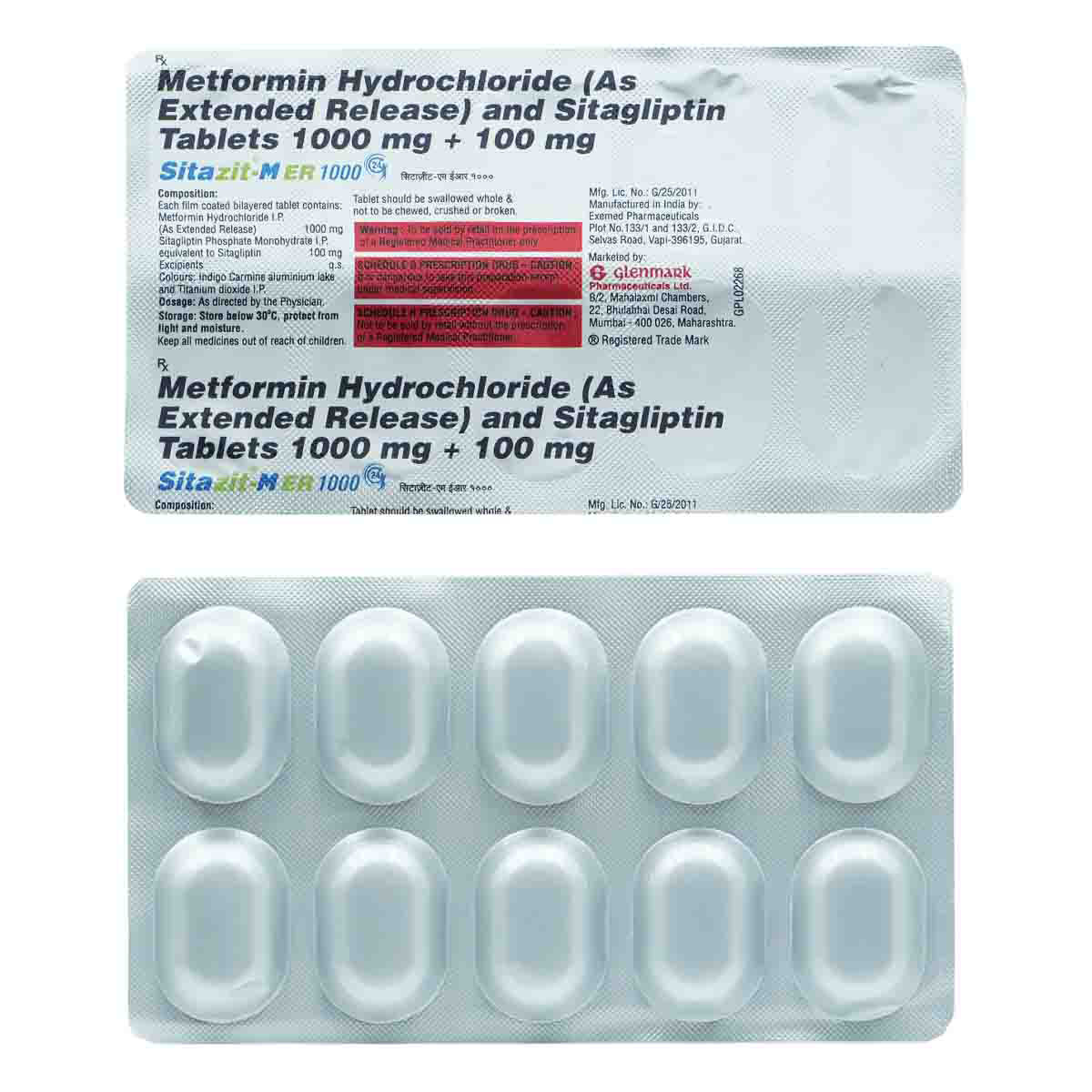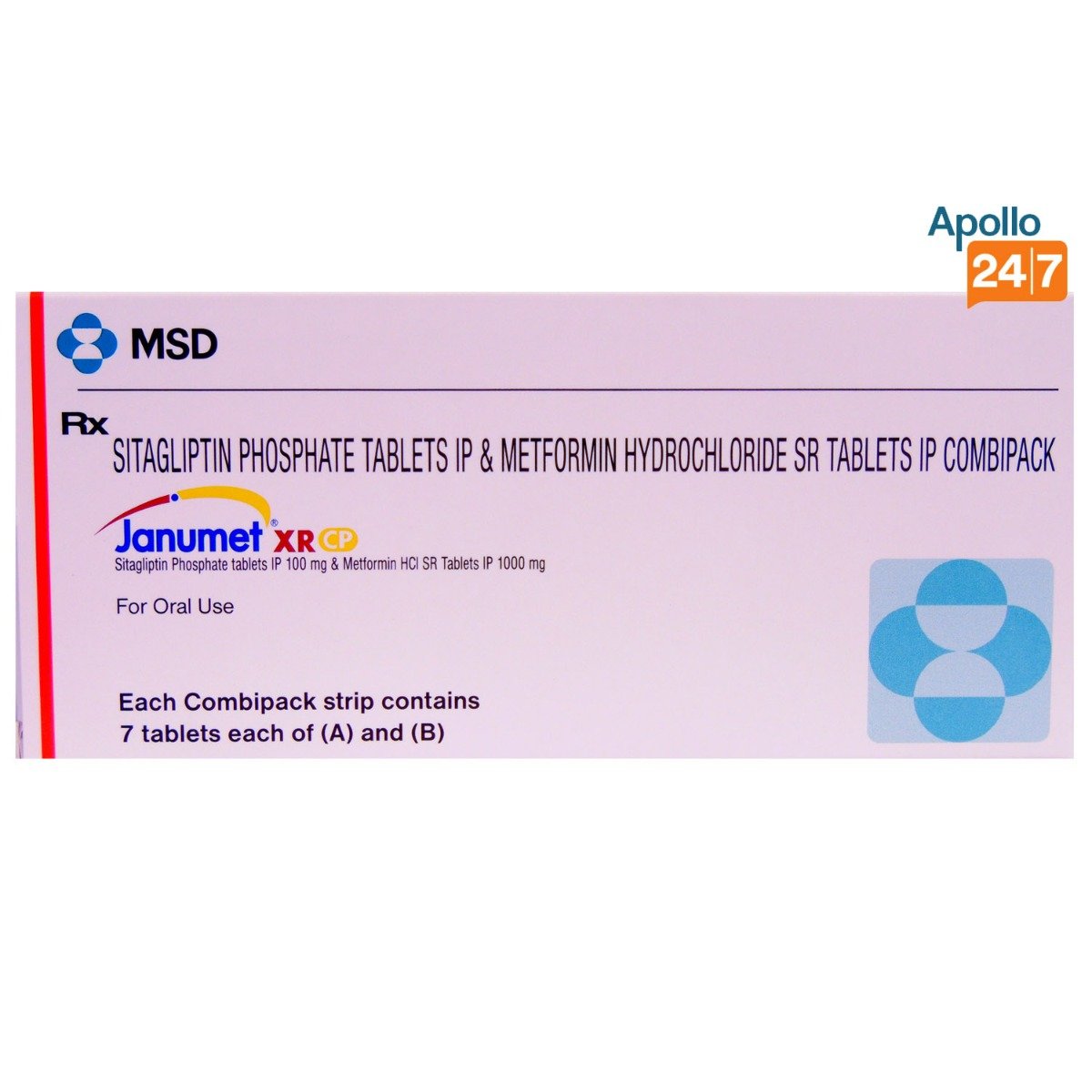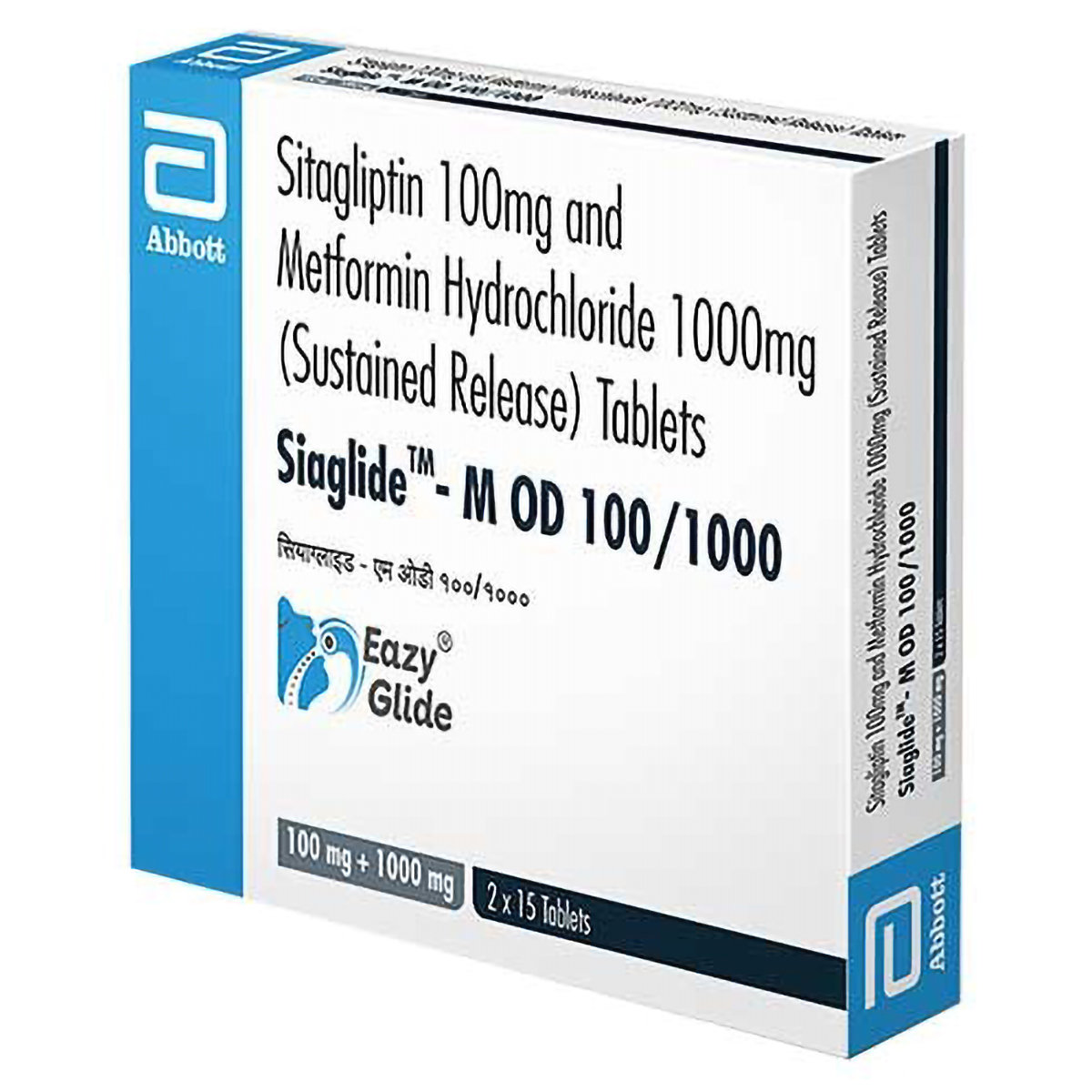Emsita-M SR 1000 mg/100 mg Tablet 10's
MRP ₹195.5
(Inclusive of all Taxes)
₹29.3 Cashback (15%)
Provide Delivery Location
Online payment accepted
 Prescription drug
Prescription drugWhats That
Composition :
Manufacturer/Marketer :
Consume Type :
Expires on or after :
Return Policy :
About Emsita M SR 1000/100 mg Tablet
Emsita M SR 1000/100 mg Tablet is a combination drug of Sitagliptin (DPP4 inhibitors) and Metformin (Biguanides) belongs to the class of anti-diabetic. Type 2 diabetes is a condition in which either the body stops producing enough insulin (the hormone which helps to decrease sugar levels in the blood) or there is resistance to the action of insulin. As a result, insulin is produced in large amounts but it is not able to act on the organs of the body.
Sitagliptin belongs to the class of dipeptidyl peptidase-4 (DPP-4) inhibitors which works by increasing the amounts of certain natural substances that lower blood sugar when it is high. Another medicine Metformin belongs to the class of biguanides which lowers glucose production in the liver, delays glucose absorption from intestines and increases the body's sensitivity to insulin. Together, it prevents blood glucose levels from rising to very high levels after meals.
Emsita M SR 1000/100 mg Tablet should be taken with food to avoid an upset stomach. Emsita M SR 1000/100 mg Tablet should be taken at the same time of the day each time for best results. For better advice, your doctor will decide, what dose should be taken and it can change timely depending upon your condition. The most common side effect of Emsita M SR 1000/100 mg Tablet is hypoglycemia (low blood glucose levels) characterised by dizziness, sweating, palpitations, hunger pangs, dry mouth and skin etc. So, to avoid hypoglycemia, you should not miss meals and also should carry some form of sugar along with you. Other side effects include taste change, nausea, diarrhoea, stomach pain, headache, upper respiratory symptoms.
Emsita M SR 1000/100 mg Tablet should not be stopped even if you feel better, without consulting your doctor as sugar level keeps changing. If you stop taking Emsita M SR 1000/100 mg Tablet abruptly, it may increase your sugar levels which could further increase the risk of eyesight loss (retinopathy), kidney (nephropathy) and nerve damage (neuropathy). Emsita M SR 1000/100 mg Tablet should not be taken if you have type 1 diabetes mellitus, severe kidney or liver disease. Please inform your doctor if you have any type of heart disease, is or planning to get pregnant or breastfeeding.
Uses of Emsita M SR 1000/100 mg Tablet
Directions for Use
Swallow it as a whole with water; do not crush, break or chew it.
Key Benefits
Emsita M SR 1000/100 mg Tablet helps your pancreas to produce more insulin, make effective utilization of insulin, and decreases excess of sugar that your liver makes. It helps in controlling rise of blood sugar level in your body after meal. Besides this, it does not cause weight gain in the prolonged use. Emsita M SR 1000/100 mg Tablet plays a vital role in controlling blood sugar levels and prevents serious complications of diabetes like eyesight loss (retinopathy), kidney (nephropathy), nerve damage (neuropathy), diabetic foot ulcer and delayed wound healing.
Storage
- Wear compression garments like stockings, sleeves, or gloves to apply pressure and help stop fluid from building up, especially after the swelling goes down.
- Move around and do exercises to help the fluid circulate, especially in swollen limbs. Ask your doctor for specific exercises.
- Raise the swollen area above your heart level several times a day, even while sleeping, to help reduce swelling.
- Gently massage the swollen area with firm but not painful pressure.
- Keep the swollen area clean and moisturized to prevent injury and infection.
- Reduce salt intake to help prevent fluid from building up and worsening the swelling, as advised by a doctor.
- If the swelling does not get better after a few days of home treatment or worsens, consult your doctor right away.
- Inform Your Doctor: Notify your doctor immediately about your diarrhoea symptoms. This allows them to adjust your medication or provide guidance on managing side effects.
- Stay Hydrated: Drink plenty of fluids to replace lost water and electrolytes. Choose water, clear broth, and electrolyte-rich drinks. Avoid carbonated or caffeinated beverages to effectively rehydrate your body.
- Follow a Bland Diet: Eat easy-to-digest foods to help firm up your stool and settle your stomach. Try incorporating bananas, rice, applesauce, toast, plain crackers, and boiled vegetables into your diet.
- Avoid Trigger Foods: Steer clear of foods that can worsen diarrhoea, such as spicy, fatty, or greasy foods, high-fibre foods, and dairy products (especially if you're lactose intolerant).
- Practice Good Hygiene: Maintain good hygiene to prevent the spread of infection. To stay healthy, wash your hands frequently, clean and disinfect surfaces regularly, and avoid exchanging personal belongings with others.
- Take Anti-Diarrheal Medications: If your doctor advises, anti-diarrheal medications such as loperamide might help manage diarrhoea symptoms. Always follow your doctor's directions.
- Keep track of your diarrhoea symptoms. If they don't get better or worse or are accompanied by severe stomach pain, blood, or dehydration signs (like extreme thirst or dark urine), seek medical help.
- Inform your doctor about the nausea and discuss possible alternatives to the medication or adjustments to the dosage.
- Divide your daily food intake into smaller, more frequent meals to reduce nausea.
- Opt for bland, easily digestible foods like crackers, toast, plain rice, bananas, and applesauce.
- Avoid certain foods that can trigger nausea, such as fatty, greasy, spicy, and smelly foods.
- Drink plenty of fluids, such as water, clear broth, or electrolyte-rich beverages like coconut water or sports drinks.
- Use ginger (tea, ale, or candies) to help relieve nausea.
- Get adequate rest and also avoid strenuous activities that can worsen nausea.
- Talk to your doctor about taking anti-nausea medication if your nausea is severe.
- Record when your nausea occurs, what triggers it, and what provides relief to help you identify patterns and manage your symptoms more effectively.
- Tell your doctor about your GAS symptoms. They may change your medication regimen or prescribe additional drugs to help you manage them.
- To manage GAS symptoms, eat a balanced diet of fibre, vegetables, and fruits.
- Drink enough water throughout the day to avoid constipation and treat GAS symptoms.
- Regular exercise like yoga and walking may help stimulate digestion and alleviate GAS symptoms.
- Take probiotics only if your doctor advises, as they may help alleviate GAS symptoms by promoting gut health.
- Take medication for GAS symptoms only if your doctor advises, as certain medications can interact with your existing prescriptions or worsen symptoms.
- If symptoms persist, worsen, or are accompanied by severe abdominal pain, vomiting, or bleeding, seek immediate medical attention.
- Preventing Vomiting (Before it Happens)
- Take medication exactly as prescribed by your doctor. This can help minimize side effects, including vomiting.
- Having a small meal before taking your medication can help reduce nausea and vomiting.
- Talk to your doctor about taking anti-nausea medication along with your prescribed medication.
- Managing Vomiting (If it Happens)
- Try taking ginger in the form of tea, ale, or candy to help alleviate nausea and vomiting.
- What to Do if Vomiting Persists
- Consult your doctor if vomiting continues or worsens, consult the doctor for guidance on adjusting your medication or additional treatment.
- Hydrate your body: Drink enough water to prevent dehydration and headaches.
- Calm Your Mind: Deep breathing and meditation can help you relax and relieve stress.
- Rest and Recharge: Sleep for 7-8 hours to reduce headache triggers.
- Take rest: lie down in a quiet, dark environment.
- Cold or warm compresses can help reduce tension.
- Stay Upright: Maintain good posture to keep symptoms from getting worse.
- To treat headaches naturally, try acupuncture or massage therapy.
- Over-the-counter pain relievers include acetaminophen and ibuprofen.
- Prescription Assistance: Speak with your doctor about more substantial drug alternatives.
- Severe Headaches: Seek emergency medical assistance for sudden, severe headaches.
- Frequent Headaches: If you get reoccurring headaches, consult your doctor.
- Headaches with Symptoms: Seek medical attention if your headaches include fever, disorientation, or weakness.
- Focus on eating nutrient-rich foods such as citrus fruits, spinach, ginger, garlic, turmeric, and fermented foods to improve immunity and general health.
- Drink plenty of water to stay hydrated, and think about taking probiotics, zinc, vitamin C, and vitamin D supplements.
- Adopt healthful practices such as leading a balanced lifestyle and remaining at home when necessary.
- Avoid smoking and drinking alcohol as it can worsen your condition.
Drug Warnings
Emsita M SR 1000/100 mg Tablet should not be used in patients with type 1 diabetes or with diabetic ketoacidosis. Some diabetic patients, while taking Emsita M SR 1000/100 mg Tablet , might develop a rare but serious condition called lactic acidosis. In this condition, too much lactic acid is accumulated in the blood, which can damage the working of your liver and kidney required to eliminate excess lactic acid from the blood. Before you start taking Emsita M SR 1000/100 mg Tablet , tell your doctor if you’ve ever had pancreatitis (inflammation of the pancreas), kidney disease, and low vitamin B12 levels. Emsita M SR 1000/100 mg Tablet , when used with insulin, Emsita M SR 1000/100 mg Tablet may lower the blood sugar level, leading to hypoglycaemia, which can be fatal. In this case, your doctor may adjust the dose by lowering the insulin dose or Emsita M SR 1000/100 mg Tablet . Prolonged intake of Emsita M SR 1000/100 mg Tablet may lower your thyroid-stimulating hormone (TSH); hence, an annual check-up of TSH is recommended. In rare cases, you may also develop a serious skin reaction known as bullous pemphigoid that requires immediate medical attention. Tell your doctor if you are going to have a diagnostic test with an injection of dye or X-ray contrast agent. You should stop using Emsita M SR 1000/100 mg Tablet for a short time before an X-ray procedure.
Drug-Drug Interactions
Drug-Drug Interactions
Login/Sign Up
Co-administration of Emsita-M SR 1000 mg/100 mg Tablet and Iodamide can increase the risk of lactic acidosis (when the body produces too much lactic acid).
How to manage the interaction:
Taking Emsita-M SR 1000 mg/100 mg Tablet with Iodamide is generally avoided as it can result in an interaction, please consult your doctor before taking it.
Co-administration of Emsita-M SR 1000 mg/100 mg Tablet and Iobenzamic acid can increase the risk of lactic acidosis (when the body produces too much lactic acid).
How to manage the interaction:
Taking Emsita-M SR 1000 mg/100 mg Tablet with Iobenzamic acid is generally avoided as it can result in an interaction, please consult your doctor before taking it.
Co-administration of Emsita-M SR 1000 mg/100 mg Tablet with Metrizamide together can cause the risk of lactic acidosis (when the body produces too much lactic acid ).
How to manage the interaction:
Taking Emsita-M SR 1000 mg/100 mg Tablet with Metrizamide is generally avoided as it can possibly result in an interaction, it can be taken if a doctor has advised it. However, if you experience headaches, muscle cramps or pain, contact a doctor immediately. Do not discontinue any medications without consulting a doctor.
Co-administration of Iopydol with Emsita-M SR 1000 mg/100 mg Tablet can increase the risk of side effects.
How to manage the interaction:
Taking Emsita-M SR 1000 mg/100 mg Tablet with Iopydol is not recommended, please consult your doctor before taking it.
Co-administration of Emsita-M SR 1000 mg/100 mg Tablet and Iocarmic acid can increase the risk of lactic acidosis (when the body produces too much lactic acid).
How to manage the interaction:
Taking Emsita-M SR 1000 mg/100 mg Tablet with Iocarmic acid is generally avoided as it can result in an interaction. please consult your doctor before taking it.
Co-administration of Iodixanol with Emsita-M SR 1000 mg/100 mg Tablet can increase the risk of side effects.
How to manage the interaction:
Taking Emsita-M SR 1000 mg/100 mg Tablet with Iodixanol is not recommended, please consult a doctor before taking it. Do not discontinue the medications without consulting a doctor.
Co-administration of Emsita-M SR 1000 mg/100 mg Tablet and Iobitridol can increase the risk of lactic acidosis (when the body produces too much lactic acid).
How to manage the interaction:
Taking Emsita-M SR 1000 mg/100 mg Tablet with Iobitridol is generally avoided as it can result in an interaction. Please consult your doctor before taking it.
Co-administration of Ioversol with Emsita-M SR 1000 mg/100 mg Tablet can increase the risk of side effects.
How to manage the interaction:
Taking Emsita-M SR 1000 mg/100 mg Tablet with Ioversol is not recommended, please consult your doctor before taking it.
Co-administration of Iopamidol with Emsita-M SR 1000 mg/100 mg Tablet can increase the risk of side effects.
How to manage the interaction:
Taking Emsita-M SR 1000 mg/100 mg Tablet with Iopamidol is not recommended, please consult a doctor before taking it. Do not discontinue the medications without consulting a doctor.
Co-administration of Iotroxic acid with Emsita-M SR 1000 mg/100 mg Tablet can increase the risk of side effects.
How to manage the interaction:
Taking Emsita-M SR 1000 mg/100 mg Tablet with Iotroxic acid is not recommended, please consult your doctor before taking it.
Drug-Food Interactions
Drug-Food Interactions
Login/Sign Up
Diet & Lifestyle Advise
- Fill your half plate with starchy veggies, a quarter with proteins, and a quarter with whole grain.
- Eat at regular intervals. Do not take a long gap between a meal or snack.
- Monitor your blood sugar level regularly especially when there are lots of fluctuations.
- Invest at least 150 min of moderate-intensity physical activity or one hour and 15 minutes of high-intensity exercise every week.
- Lose weight gradually to achieve a healthy body mass index (18.5 to 24.9).
- Replace refined carbohydrates-containing foods with whole grain foods and increase the intake of fruits and veggies and other fibre-enriched foods.
- Reduce intake of saturated fat (or hidden fats) in food like chips, crisps, pastries, biscuits, and samosas. Choose omega-3 fatty acid-containing oils for daily cooking. For frying, you can use palm oil, mustard oil, groundnut oil, rice bran oil, and safflower oil.
- Do not take stress as it may elevate your blood sugar level. You can adopt stress management techniques like mindfulness to control stress-related blood sugar changes.
- Opt for low-fat dairy products (low-fat yoghurt, fat-free milk, cheese, etc.).
- Keep your blood pressure as normal (140/90) as possible. As it reduces the risk of cardiovascular diseases in diabetes patients.
Side Effects of Emsita M SR 1000/100 mg Tablet
Low blood sugar
Runny nose
Sore throat
Upper lung infection
Diarrhoea
Nausea
Vomiting
Gas
Stomach upset
Indigestion
General weakness
Headache
Habit Forming
Therapeutic Class
All Substitutes & Brand Comparisons
RX
Sitapride-M 100 mg/1000 mg Tablet 15's
Micro Labs Ltd
₹195.5
(₹11.73 per unit)
33% CHEAPERRX
Corsita M 100/1000 Tablet 10's
Medley Pharmaceuticals Ltd
₹146
(₹13.14 per unit)
25% CHEAPERRX
Alsita-M 100 Forte Tablet 10's
Alkem Laboratories Ltd
₹156.5
(₹14.09 per unit)
19% CHEAPER
Author Details
We provide you with authentic, trustworthy and relevant information
Drug-Diseases Interactions
Drug-Diseases Interactions
Login/Sign Up
FAQs
Drug-Drug Interactions Checker List
- BUPROPION
- CEPHALEXIN
- CIPROFLOXACIN
- CIMETIDINE
- DIGOXIN
- DOLUTEGRAVIR
- GLYCOPYRROLATE
- TOPIRAMATE
- LAMOTRIGINE
- RANOLAZINE
- ALPHA LIPOIC ACID
- ASPIRIN
- PROTHIONAMIDE
- PEGVISOMANT
Disease/Condition Glossary
Type 2 diabetes is a condition where the body is unable to make sufficient insulin, or the insulin that it makes doesn't work properly or utilized by our body. This can cause high blood sugar levels (hyperglycaemia). Symptoms of type 2 diabetes include increased thirst, frequent urination at night, slow wound healing, increased hunger, fatigue, and blurred vision. In some cases, there may be weight gain while in rare cases weight loss may be observed. The complication of type 2 diabetes also includes neuropathy (nerve problems), nephropathy (kidney problems), and retinopathy (damaged retina of eyes or blindness), loss of limbs, sexual dysfunction, and an increase the chance of heart attack or stroke.

Have a query?
Alcohol
Safe if prescribed
It is best to avoid alcohol while taking medication.
Pregnancy
Consult your doctor
Emsita M SR 1000/100 mg Tablet is only recommended during pregnancy when the benefit outweighs the risk. Please consult your doctor before starting Emsita M SR 1000/100 mg Tablet if you are pregnant or planning to conceive.
Breast Feeding
Consult your doctor
Consult your doctor; Emsita M SR 1000/100 mg Tablet should be used in breastfeeding mothers only if the benefits outweigh the risks.
Driving
Safe if prescribed
Drive only if you are physically stable and mentally focussed, If you experience drowsiness after taking these medications you should not drive or operate any machinery or vehicles.
Liver
Consult your doctor
If you have or had a history or evidence of any liver-related diseases, please consult the doctor before taking medicine.
Kidney
Consult your doctor
If you have or had a history or evidence of any kidney-related diseases, please consult the doctor before taking medicine.
Children
Safe if prescribed
It is advisable to consult a doctor before using it.
Recommended for a 30-day course: 3 Strips

